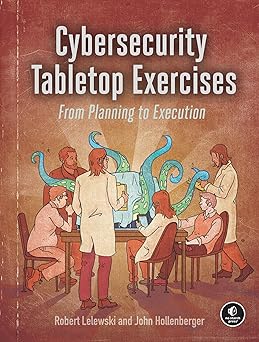

Most ebook files are in PDF format, so you can easily read them using various software such as Foxit Reader or directly on the Google Chrome browser.
Some ebook files are released by publishers in other formats such as .awz, .mobi, .epub, .fb2, etc. You may need to install specific software to read these formats on mobile/PC, such as Calibre.
Please read the tutorial at this link: https://ebookbell.com/faq
We offer FREE conversion to the popular formats you request; however, this may take some time. Therefore, right after payment, please email us, and we will try to provide the service as quickly as possible.
For some exceptional file formats or broken links (if any), please refrain from opening any disputes. Instead, email us first, and we will try to assist within a maximum of 6 hours.
EbookBell Team
4.7
106 reviews
ISBN 10: 1718503822
ISBN 13: 978-1718503823
Author: Robert Lelewski, John Hollenberger
The complete start-to-finish guide for planning and delivering successful cybersecurity tabletop exercises.
Cybersecurity Tabletop Exercises, written by veteran security consultants Robert Lelewski and John Hollenberger, is an essential resource for cybersecurity professionals and anyone tasked with enhancing their organization’s incident response capabilities. This comprehensive guide to tabletop exercise planning and delivery offers practical insights, step-by-step instructions, and real-world examples to improve your team’s ability to prevent and respond to cyberattacks.
The book is divided into two main parts. In Part I: The Tabletop Exercise Process, you’ll learn:
The example scenarios in Part II include:
With examples tailored for various roles, you’ll discover how to transform tabletop exercises from a mere compliance requirement into a powerful strategic preparedness tool. Whether you’re new to tabletop exercises or an experienced practitioner, this book provides proven insights to strengthen your organization’s cyber incident response capabilities and overall security posture.
Part I: The Tabletop Exercise Process
1. Why Perform Tabletop Exercises?
Reasons to Conduct a Tabletop Exercise
Improve Incident Response Team Collaboration
Clarify Team Roles and Responsibilities
Assess the Impact of Process Changes
Reduce the Cost of Data Breaches
Improve Security Awareness
Explore Key Questions
Prepare Senior Leadership for an Incident
Align with Industry Standards
Fulfill Contractual Requirements
Examine a Recent Cybersecurity Incident
Identify and Prioritize Risks
Advantages of Tabletops over Other Security Exercises
Low Cost and High Return on Investment
Efficiency
No Operational Disruption
What Tabletop Exercises Can Test
The Potential Impact of Current Threats
The Sufficiency of the Information Security Budget
Information Sharing Protocols for IoCs
Gaps in the Incident Response Plan
The Efficacy of Processes and Procedures
Compliance with Notification Requirements
Residual Risk After Corrective Actions
Summary
Questions
2. Planning the Tabletop Exercise
Securing Executive Sponsor Support
Choosing an Appropriate Executive Sponsor
Outlining the Executive Sponsor’s Responsibilities
Defining the Exercise’s Goals and Objectives
Rehearsing the Incident Response Plan
Understanding Organizational Incident Response Roles
Assessing Vendor Response
Evaluating Communication Processes
Senior-Level vs. Operational-Level Exercises
Determining Who Should Participate
External Vendors
Legal Support
The Development Team
Logistical Considerations
Hosting Remote vs. In-Person Exercises
Determining the Duration
Choosing a Date and Time
Securing a Facility
Setting the Tone
Notifying and Preparing Exercise Attendees
The Executive Checkpoint
The Initial Email Notification
Calendar Invitations
The Discussion Session
Informal Touchpoints
The Final Reminder
Scenario Confidentiality
Opposition from Invitees
Outsourcing Tabletop Exercises
Summary
Questions
3. The Development Process: Where the Rubber Meets the Road
Choosing a Topic
Consult Your Business Impact Analysis
Confer with the Executive Sponsor
Leverage Other Resources for Inspiration
Developing the Scenario
Characteristics of an Effective Scenario
Sources of Inspiration for Your Scenario
Introducing Injects
Simulate Time Constraints
Direct Focus
Balance Clarity and Conciseness
Designing the Exercise Storyboard
Considering the Scenario Escalation Pace
Crafting Your Ground Truth Document
Add Details and Expected Outcomes
Maintain Realism
Align with Objectives
Creating the Presentation Deck
Introductions
The Preamble
Injects and Exercise Discussions
The Debrief
Inviting Feedback
Summary
Questions
4. Facilitating a Successful Tabletop Exercise
The Facilitator’s Role
Tabletop Management Tasks
Assigning a Scribe
Adding a Co-facilitator
Inviting a Guest Presenter
Prewriting Questions
Exercise Tools and Tactics
A Writing Board
Polling Software
Remote Presentation Software
Multimedia Aids
Attendee Tasks and Breakout Groups
Recording Devices and Software
Making the Most of the Exercise Space
Maximize the Conference Room Layout
Work the Room to Boost Engagement
Communication Tips
Monitor Physiological Responses
Set Up Backchannels
Check in with Senior Attendees
Manage Conversation Hogs
Forge Interpersonal Connections
Consider the Question Structure
Pay Attention to Nonverbal Communication
Practice Cultural Awareness
Identify Sensitive Topics Beforehand
Summary
Questions
5. Acting on What You’ve Learned: Evaluation and Next Steps
Evaluation Requirements and Restrictions
Choosing an Evaluator
Evaluation Methods
Performing a Debrief
Sending a Survey
Reporting Conventions
Statement of Completion
Full Report
Follow-up Activities
Assess the Incident Response Plan
Catalog and Update Other Documentation and Processes
Conduct Follow-up Tabletop Exercises
Implement a Formal Tabletop Exercise Program
Communicate High-Level Exercise Findings
Identify and Analyze Trends
Summary
Questions
Part II: Example Scenarios
6. Engaging a Technical Audience
A Widespread Phishing Campaign
The Scenario
Possible Modifications
Ransomware Affecting File Servers (the Technical Version)
The Scenario
Possible Modifications
A Malware Outbreak via a Zero-Day Vulnerability
The Scenario
Possible Modifications
A Supply Chain Compromise
The Scenario
Possible Modifications
7. Engaging an Executive Audience
Ransomware Affecting File Servers (the Senior-Level Version)
The Scenario
Possible Modifications
A Dark Web Data Discovery
The Scenario
Possible Modifications
A Distributed Denial-of-Service Attack
The Scenario
Possible Modifications
8. Engaging the Business
A Physical Security Breach
The Scenario
Possible Modifications
A Social Media Compromise
The Scenario
Possible Modifications
An Insider Threat
The Scenario
Possible Modifications
stochastics and dynamics editorial board
stochastic dynamics and control
dynamic and stochastic models
stochastic dynamic analysis
dynamic stochastic
Tags: Robert Lelewski, John Hollenberger, Cybersecurity Tabletop, From Planning